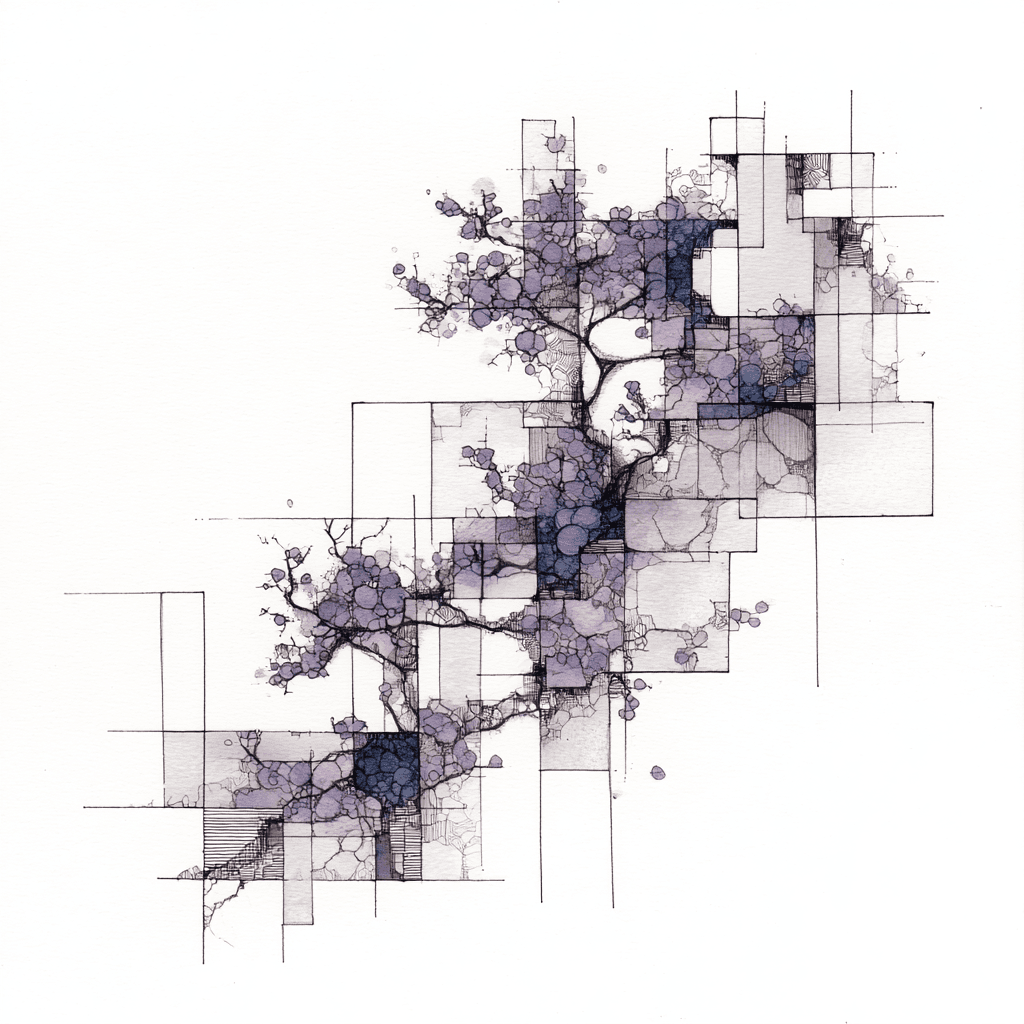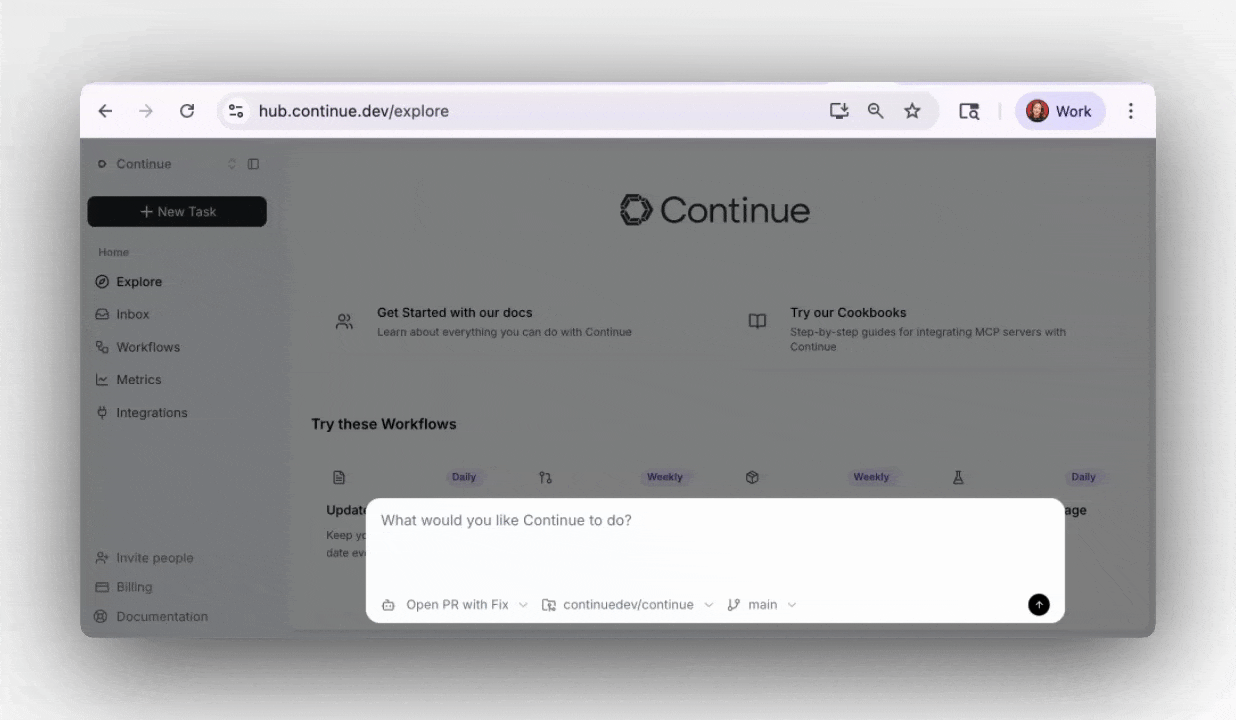
How Continue Cloud Agents Increase Developer Productivity
I know I'm not the only one that carries over things from week to week on my to-do list. A lot of times, it's something small like removing old code comments your left for “future me,” deleting a deprecated feature flag, updating a badge, or this week, in my case, refreshing the docs banner. None of these are big jobs. They take ten, maybe fifteen minutes. They're not complex enough to be interesting, but just annoying enough to make you reach for another cup of coffee instead.
A cloud agent is an AI-driven process that runs on remote infrastructure, is triggered by tasks, schedules, or external events, and uses reasoning over changing inputs to produce reviewable outcomes across shared engineering systems. Read more about them in our Cloud Agent Taxonomy Guide.
We call these tasks "frogs," the things you're supposed to "eat" first thing in the morning, according to productivity gurus. But what if you didn't have to eat them at all? What if you could just describe them, and watch them get done?
The Procrastination Tax Your Team Pays
Individually, these tasks are tiny. But across a team? They add up. Documentation fixes. Config tweaks. Dependency bumps. Small refactors. Style updates.
None of it requires deep architectural thinking. All of it steals momentum. These tasks share a pattern of Low-stakes, but High-friction.
The mental cost of switching into “maintenance mode” is bigger than the task itself. Multiply that across a team of five, ten, or fifty developers, and you’re running a frog farm.
Last week I tackled a bunch of these for my personal projects, fixing layout shifts, merging two nearly identical landing pages, updating blog tags, refreshing my About page. Each task was under twenty minutes.
Context-switching has a real cognitive cost, and our brains are pretty good at recognizing when something is going to require more mental energy than it seems worth. And that friction compounds across a codebase, sprint, or organization.
Continue Cloud Agents: Removing Friction at the Team Level
Continue cloud agents are your task executors, AI that can take structured action on your trigger through Tasks, Integrations, and Workflows, and do it consistently across an entire team.
So let me show you how this works in real life.
After last week’s UI changes (if you haven't already, check out our new Mission Control!), someone in the community asked where a tool had gone. Adding a small docs callout felt like another way to help others avoid the same confusion.
I opened Continue → Added a new task → typed:

My Agent located the file, made the update, and showed me the diff.

Thirty seconds. Zero mental drag. And importantly, I stayed in the loop to approve the changes.
Eating the Frog: Automating Technical Debt with AI
Tell me if any of these "frogs" resonates:
- Removing Deprecated Feature Flags (Everyone knows they’re dead… but someone still has to hunt them down across components, configs, and tests.)
- Deleting Dead Components or Files (That old OldDashboard.tsx or utils.old.ts no one uses but everyone is scared to touch without verifying.)
- Renaming Files to Match Their Exports (The classic: File: user-service.ts Export: UserService)
- Adding JSDoc comments (Especially for shared utilities where “someone should document this later” never actually happens.)
- Consolidating Duplicate Logic (Two nearly identical helper functions living in different folders because “we’ll refactor that when we have time.”)
- Generating a Changelog From Recent PRs (Everyone wants a clean changelog. Nobody wants to gather commit messages, summarize changes, and format it properly.)
- Generating or Updating Missing Documentation After PRs (The PR merged last week changed behavior, added an option, or renamed something…but the docs didn’t follow. Happens in every repo.)
For teams, this is where the value compounds. If every developer avoids 15 minutes of “frog work” five times a week, you just recovered hours per engineer.
What AI Means for Developer Productivity
I've read a lot of productivity advice over the years. "Eat the frog." "Do the hard things first." "Break tasks into smaller pieces." All of this advice assumes that the barrier to completing tasks is either motivation or difficulty.
If you're not sure when to use Cloud Agents, check out our When to Use Cloud Agents Guide.
For years, we've focused on making individual coding tasks faster with things like better autocomplete, smarter syntax highlighting, faster compile times.
But what if the real productivity gains come from removing friction at a higher level? What if it's not about typing faster, but about eliminating the barriers that prevent us from taking action in the first place?
Continue's philosophy focuses on amplifying developers rather than replacing them. This is what amplification looks like: not replacing your judgment or creativity, but handling the mechanical work that was never where your value lived in the first place. The cost of completing a task is now roughly equal to the cost of thinking about the task. The thought-to-action gap is gone.
Eating the frog just got easier. Not because the frog got smaller, but because someone else is willing to do the chewing for you while you stay in control of what gets eaten.
The frogs on your to-do list are waiting. But now, you don't have to eat them alone.
Want to try a Continue Cloud Agent yourself? Visit hub.continue.dev to get started. And if you have your own "frog" stories—those tasks you've been putting off that Agent mode helped you complete—we'd love to hear them or if you need a quick list:
7 Maintenance Tasks ("Frogs") AI Can Automate:
- Removing deprecated feature flags across the codebase.
- Updating documentation to match recent PR changes.
- Renaming files to match export conventions.
- Generating changelogs from commit history.
- Backfilling missing unit tests for legacy components.
- Translating raw error logs into readable tickets.
- Standardizing CSS class naming conventions.